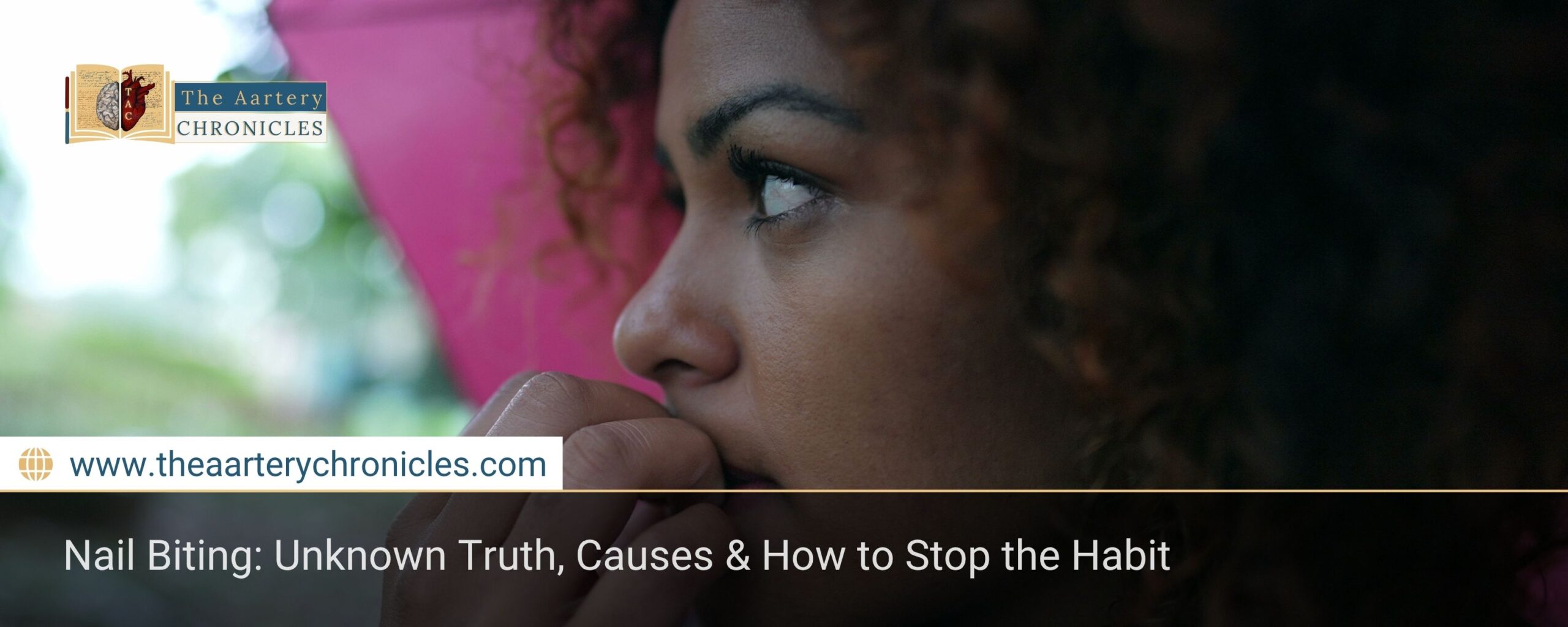

Nail Biting: Unknown Truth, Causes & How to Stop the Habit
Summary: Nail biting is not just an undesirable habit but a deeply ingrained behavioural disorder with long-term psychological, oral, and social implications. Overlooked and undervalued, the condition, also called onychophagia by doctors, afflicts children and grown-ups. In this article, we dive deep into its underlying causes, health risks, and professional-endorsed methods of overcoming it. If you or your child are nail biters, grasping the science behind it is your passport to liberation.
The Unknown Truth Of Nail Biting
Nail biting is often dismissed as a childhood habit that one outgrows as one ages. Nail biting (NB) remains one of the unresolved mysteries in the fields of
- Psychiatry
- Psychology
- Medicine
- Dentistry
Though nail biters make every effort to stop it, they are unsuccessful in beating this habit. No amount of threat or punishment or any other form of rebuke can stop this habit easily.
What Is Nail Biting and Who Does It Affect?
In operative terms, nail biting is
“putting one or more fingers in the mouth and biting on the nail with teeth” – as stated in Teng EJ, Woods DW, Twohig MP, Marcks BA. – Body-focused repetitive behaviour problems.
Nail Biting is also known as Onychophagia or Onychophagy.
Nail biting begins in children at three years of age, gradually increasing through adolescence and decreasing in adulthood. However, there are no statistics available for the same.
Nail biting occurs irrespective of
- Gender
- Peer pressure
- Conduct problems
- Hyperactivity
- Inattentiveness.
Each family has at least one member who is a nail biter, i.e. 36.8% (95% 22.3 to 44.2). American studies show that 23% of pre-school children aged three to six years are nail biters.
In Mangalore, India, the percentage of nail-biting children is 12.7%, with girls outnumbering boys. About 24.1% of nail biters often suffer from temporomandibular joint pain and dysfunction.
Factors Responsible For Nail Biting
The following factors give rise to the habit of nail biting:
- Behavioral issues
- Inadequate motor activity in young children
- Anxiety/tension
- Boredom
- Force of habit
Co-Morbidities Associated with Nail Biting
Clinical studies have found that children who bite their nails are more likely to experience certain psychological and developmental disorders, including:
Attention Deficit Hyperactivity Disorder (ADHD) – 74.6%
Oppositional Defiant Disorder (ODD) – 36%
Separation Anxiety Disorder – 20.6%
Enuresis (involuntary urination) – 15.6%
Tic Disorders – 12.7%
Obsessive Compulsive Disorder (OCD) – 11.1%
Major Depressive Disorder – 6.7%
Intellectual Disability – 9.5%
Pervasive Developmental Disorder (PDD) – 3.2%
In clinical samples, 100% of boys and 81% of girls who bit their nails were found to have at least one of the above co-morbid conditions.
Additionally, 56 out of 509 individuals with nail-biting behaviour were diagnosed with Obsessive Compulsive Disorder (OCD).
Interestingly, one study also found that children of mothers with schizophrenia were more likely to develop nail-biting habits than those whose mothers had bipolar disorder.
Consequences Of Nail Biting
The following are the consequences of nail biting :
- SHAME: Parents and family members of the nail biters feel ashamed of them, in social circumstances.
- DEMORALIZING : Nail biters are often laughed at and demoralized by their peers, resulting in low self-esteem.
- RESTRICTIONS: Nail biters feel restricted from carrying out normal activities using their hands in public i.e. shaking hands, eating, clapping, etc.
- ATTACKS: Children with this habit are more susceptible to attacks from their peers.
- GOADING : Children are goaded that even though they can stop this habit, they do not like/want to do so.
- BEHAVIOR: Such demoralising behaviour of others increases the levels of stress, anxiety, hopelessness, frustration and helplessness.
- ORAL HEALTH ISSUES : Oral health issues like Enterobacteriaceae are more commonly found in children with the habit. The germs reach the root of the teeth, giving rise to apical root resorption, alveolar destruction, malocclusions, temporomandibular disorders, gum injuries, and tooth root damage, to name a few.
- NAIL DAMAGE: Nail biting may damage the tissues that surround the nails and cause infections. It may also damage the nail beds which affect the growth of nails, causing them to disappear! It may lead to hang nails, bleeding, damaged cuticles, shortened and damaged nails.
- GASTRIC ISSUES : The germs that find their way to the stomach through the nails, result in gastric issues like stomach ache, diarrhea etc. and other infections.
- APPEARANCE : Bitten nails do not look appealing. If a person is impeccably dressed but has nail-bitten fingers, he will be looked down upon, though he may make every effort not to feel awkward.
Remedial Measures for Nail Biting
These are the remedial measures which prevent the nail biting habit:
- AWARENESS : The parents and siblings of the child should be made aware of the harm nail biting does and they should be taught to handle the child effectively. Rather than punishing or scolding the child, they should patiently help the child leave the habit. They should talk with the child and make him feel safe so that he can speak out his mind and why he had to resort to nail biting, and such problems should be handled delicately.
- SUPPORT : The parents and siblings should understand and support the child, include him in social surroundings, and instill confidence and lower the anxiety the child may be facing. Many a times, lack of confidence or anxiety may be the reason the child is a nail biter. With the increased confidence, love and support of the family, he may gradually leave the habit.
- CIRCUMSTANCES : If the child is biting nails out of boredom, the family should ensure that there are enough activities to keep him occupied throughout the day, so that the habit may gradually decrease. Diversion is a great tactic.
- NAIL PAINT/COSMETICS : Painting the nails with a bitter tasting nail polish (denatonium benzoate) may deter the biting of nails.
- HABIT REVERSAL TRAINING (HRT) : This makes the nail biter unlearn the habit and replace it with a more constructive habit. Engage in some activity with your hands when you get the urge to bite your nails – squeezing a stress ball, clapping, stretching, drawing, or any other activity involving your hands. The further the hands from your mouth, the better !
- STIMULUS CONTROL THERAPY : This involves identifying the stimulus that encourages nail biting and eliminating it, to prevent it from triggering the habit.
- DENTAL DETERRENT : The use of dental deterrent devices prevent the front teeth from damaging the nails and surrounding cuticles. A couple of months of use shows the desired result – the end of nail biting!
- TRIMMED NAILS : Keep the nails short and trimmed, so that there is not enough nail to bite 😊
- NAIL PROTECTOR : Wear light gloves or stick a tape on the nails to prevent nail biting.
- NAIL SPA : Get a nail spa done – yes. Obviously, you will not bite your nails if you have spent money on the spa to make them look good!
- PATIENCE : Try to stop nail biting gradually –one finger on each hand, at a time, till you can control your urge and leave the habit. It takes time, but it will happen , if you trust yourself.
Bad habits die hard, but they do die! Patience and willpower are what is required to get rid of bad habits. Just think about it:
- What good is the habit?
- Is it benefiting you in any way?
- Will you die without it?
- Is it making you a social outcast?
- Are people going to praise you for it?
- Should you be rewarded for it? The answer to all these questions is NO.
This habit is harming you, so what is the logical step to take ? Gradually, remove it from your life. Remember all the times you had gastric issues because of the germs on your nails that made their way inside your body; the passage of germs from the mouth to the internal organs; Not a pleasant thought, I am sure. Remember the harm it caused, so that you do not begin it again. You can do it, its not rocket science.
UGH FACT: Some people bite their toenails! How gross is that!
Conclusion
If you are under stress and can’t quit biting your nails, speak with a loved one, resolve your stress and leave the habit.
If you have tried and are unable to kick this habit, seek the advice of a medical practitioner/ dermatologist/therapist.
If you are an adult, set an example for your child. Don’t bite your nails!
Reference:
- https://www.aad.org/public/everyday-care/nail-care-secrets/basics/stop-biting-nails
- https://pmc.ncbi.nlm.nih.gov/articles/PMC3556753/

Ms Rupal Sonpal
Reviewed by Dr Aarti Nehra








